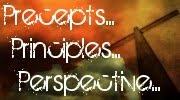At some point suddenly in his wandering about, some ferocious animals, catching his scent, gave chase. In the dark of night, bitter cold, running through the forest, he happens upon a small creek bed that he falls into. Now thoroughly immersed in frigid cold waters that rendered him even more desperate and as he had already been cold, hungry and fearing for his life, he wades furiously out of the water and struggles out the other end of the forest and sees the most imposing castle with guards stationed around it. He is afraid of two things now, the animals chasing him from behind, and the possibility of being shot on the spot by the guards ahead for trespassing. He stands between two possibilities - two choices. In a flash, he reasons that the animals, by their very nature will tear him apart. He realizes something else, that if he runs towards the guards in a manner of surrender, they might be willing to at least hear him out. He decisively sprints ahead to the front gates and its guards, waving his wet, blood stained shirt above his head. As he approaches, the guards look at him stunned, but he expected that much. What he didn’t expect was the way that they hurried, not to answer with firing at him, but instead, rushing to open the gates, they threw their coats upon him & assisted him to the entrance door of the castle itself. He hears much commotion as he enters. It’s too much for him. The throbbing in his head, the cold, wet, confusion of it all causes him to pass out.
Several hours later, he wakes up in a warm bed, with comfortable dry clothing on & an elegant room full of attendants staring all around him. Confusion & fear grips him because he again realizes he doesn’t fully understand what has happened and what is about to happen next, he asks the obvious series of questions as he breathes deeply and hurriedly to keep up with the speeding beat of his heart, “Where am I? Who are you? Who am I?”. To which one of the attendants standing by answers, “Your highness, do you not realize you are in your own room?” Upon hearing this, confusion slowly dissipates as a tingling sensation of familiarity sweeps his body along with a rush of memories as he studied the room and the faces in it. Astonished by all that has taken place the prince then says to himself, “what I once feared to enter into, was where I did not know that I was loved and what I myself do love.”




